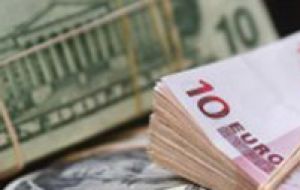MercoPress. South Atlantic News Agency
US dollar slumps to its lowest in 14 months against the Euro, 1.50
 Low interest rates and concerns about US budget deficits are hitting the greenback
Low interest rates and concerns about US budget deficits are hitting the greenback The US dollar slumped Wednesday, with the Euro rising above 1.50 for the first time in 14 months, as optimism about the global economic recovery boosted demand for higher yielding currencies.
The Euro was up 0.4% versus the dollar to 1.5010 after trading at 1.5018 earlier. It was the first time the 16-nation currency climbed above 1.50 since August 2008. The British pound gained 1.3% against the greenback at 1.6596. Against the Japanese yen, the dollar was up 0.2% to ¥90.9.
As economic news improved beginning last March investors have been encouraged to abandon the perceived safety of the US dollar to seek higher returns in more risky assets such as stocks and commodities.
That trend was in effect earlier Wednesday as US stocks and oil prices rallied following upbeat financial results from Morgan Stanley and Wells Fargo. But the momentum faded in the afternoon, with the Dow Jones industrial average slipping from a one-year high.
While the currency trade has followed the lead of the stock market in recent sessions, the retreat on Wall Street did not help the greenback Wednesday. The dollar has also been pressured by concerns about the US giant budget deficit which topped 1.42 trillion in fiscal 2009.
The US government has spent billions to help combat the worst economic crisis since the Great Depression while the Federal Reserve has slashed interest rates to historic lows near 0% to help revive the economy.
While the US economy has shown some signs of improvement, the likelihood of a robust recovery remains in question. That has led many traders to bet against the dollar based on the assumption that rates will remain low for a longer-than-expected period of time.
Looking ahead, many analysts warn that deficit concerns could continue to weigh on the dollar as the US government considers expensive new programs such as health care reform. However, some economists say a weaker dollar could help facilitate the economic recovery by boosting profits for US companies that sell goods overseas.




Top Comments
Disclaimer & comment rulesCommenting for this story is now closed.
If you have a Facebook account, become a fan and comment on our Facebook Page!